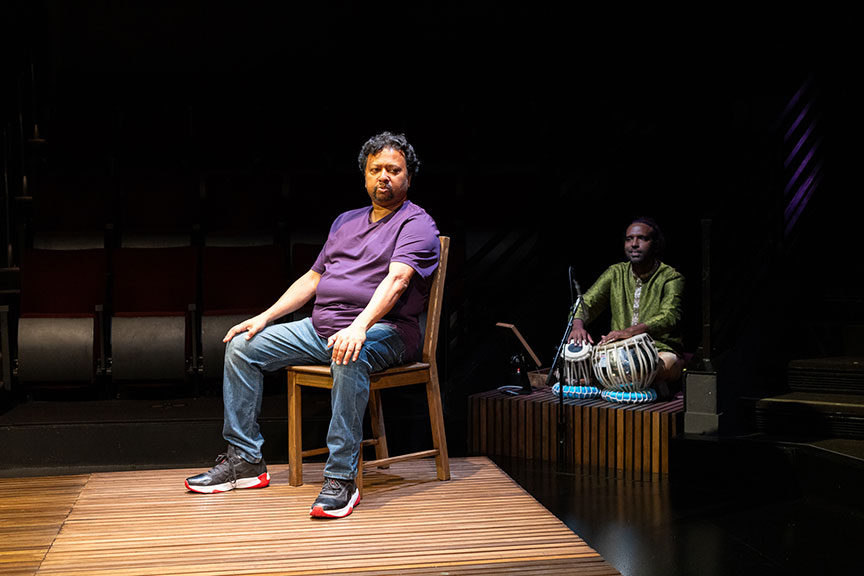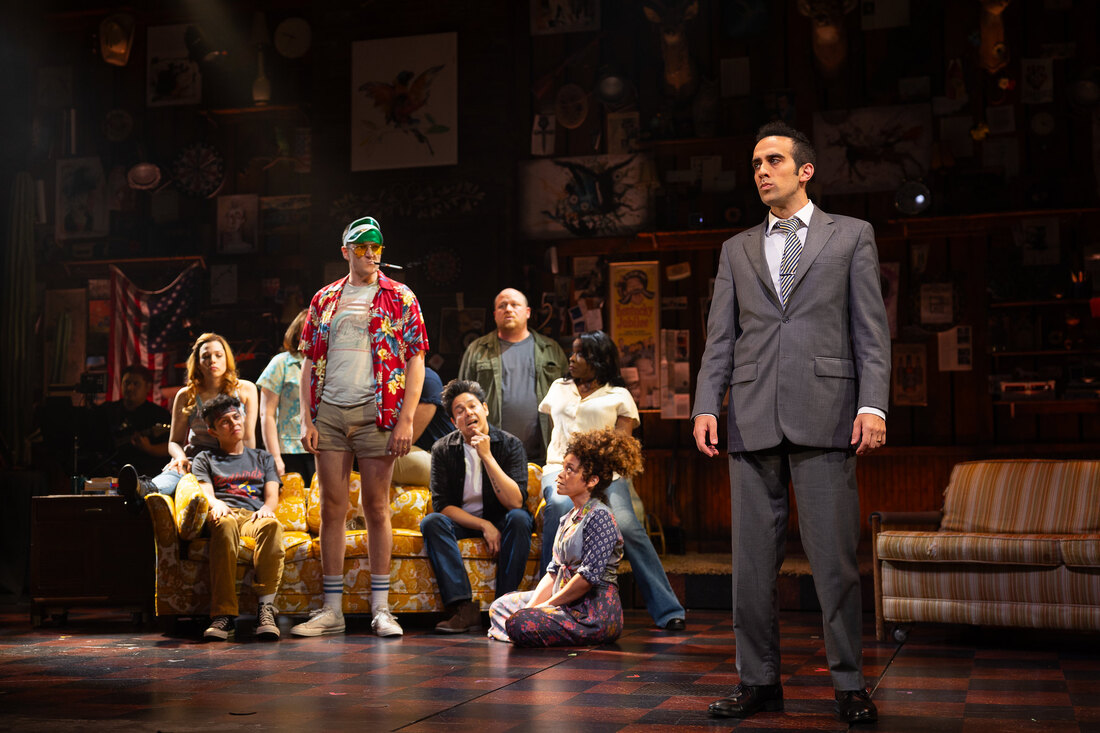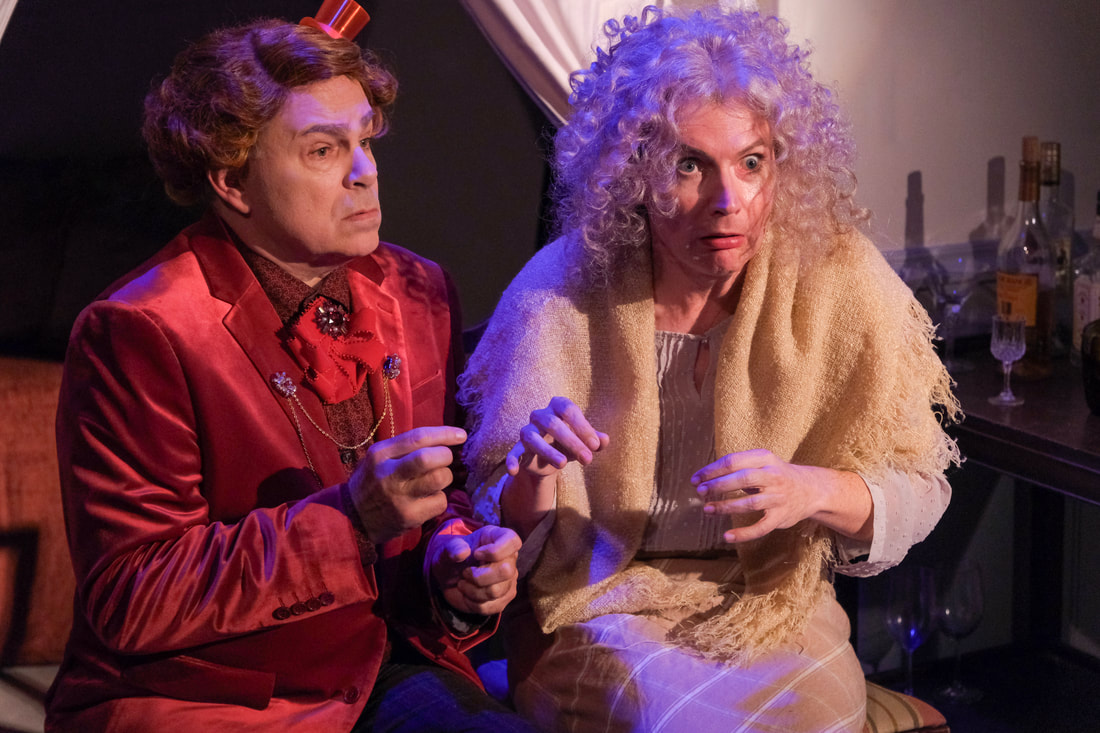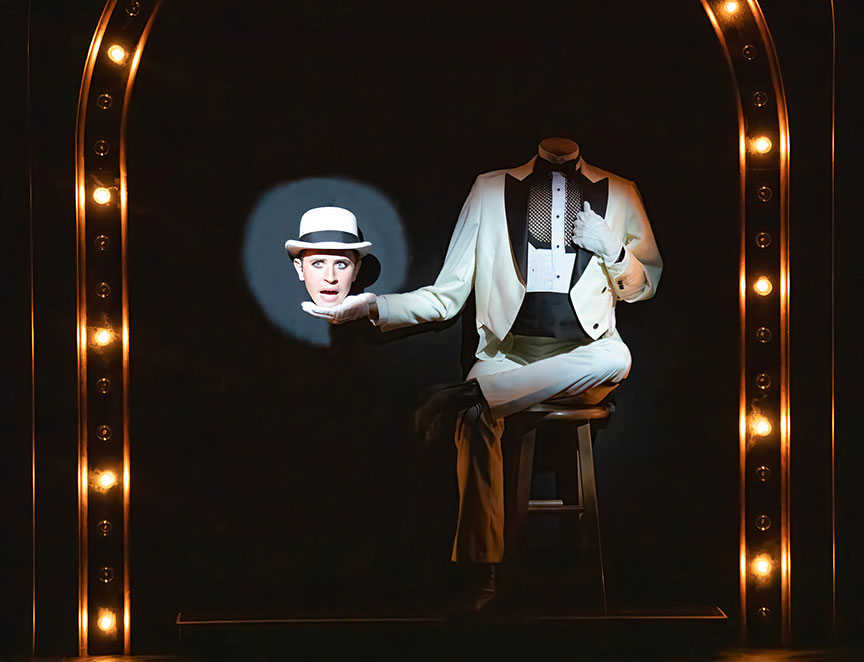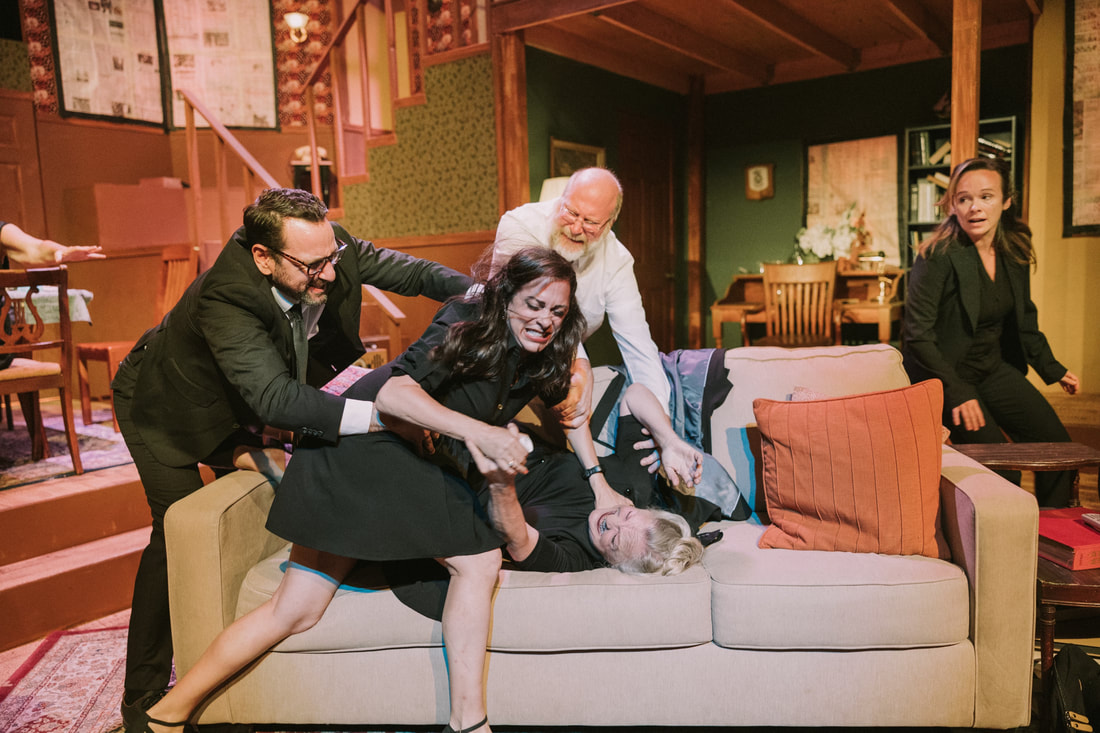|
Alaudin Ullah (left) and Avirodh Sharma in "Dishwasher Dreams." Photo by Rich Soublet II I wish that everyone who owns a MAGA cap could see a performance of Alaudin Ullah’s solo show “Dishwasher Dreams.” If plain facts can’t persuade them that there’s hard work, sacrifice and even tenderness in the immigrant experience, maybe this autobiographical story of Ullah and his Bengali family could.
There’s also great value in what Ullah has to share about being Muslim and about what ignorant people think Muslims are. OK, I acknowledge I’m getting all political here, but Ullah’s “Dishwasher Dreams,” directed by Chay Yew, is not a political piece. A onetime standup comic with “Comedy Central,” HBO and MTV credits to his name, Ullah utilizes humor and lots of it to tell the tales of his Bengali parents, his own experiences in his two homelands (Bangladesh and the United States) and a career that has taken him from the standup stage to theaters like the Old Globe’s Sheryl and Harvey White space where “Dishwasher Dreams” is in production. Ullah’s most strident commentary has to do with how Muslims are perceived, in particular by Hollywood. He re-creates near the end of the 100-minute show an audition he did for suits who wanted him to spout stereotypical (and offensive) “Muslim terrorists” dialogue. But the lion’s share of “Dishwasher Dreams” is comprised of Ullah’s breathless storytelling: about his dishwasher father’s life in Spanish Harlem; about his mother and the life she would go on to lead in America as well; about the “magic” of Yankee Stadium, how for a wide-eyed boy it became another “Mecca” with Reggie Jackson his adored idol; how a visit back home to Bangladesh as a boy forged a friendship that ultimately had a tragic ending. Accompanying Ullah, who under Yew’s direction flits from place to place on the White theater-in-the-round stage, is tabla musician Avirodh Sharma. (He also delightfully warms up the audience before the show starts.) Though Ullah’s delivery and cultural references are those you might anticipate from any seasoned standup performer, there is always the awareness of his heritage, of the fun he can have with it but the deep pride he falls about it. An early influence was George Carlin, who among other things showed Ullah that joking about religion can pay off. The legendary comedian who made famous “The Seven Words You Can Never Say on TV” was almost as big a hero to Ullah as was Mr. October, the Yankees’ indomitable Jackson. What surprised me about this show, especially after I’d interviewed Ullah for a San Diego Union-Tribune feature story and found him just hilarious, was how touching “Dishwasher Dreams” is. There are moments that catch in your throat, proving that when it comes to families so much is universal among nations, among peoples, among ethnicities. A hundred minutes is a lot for a one-person affair, but “Dishwasher Dreams” is a consistently compelling audience experience. “Dishwasher Dreams” runs through Oct. 15 in the Old Globe’s Sheryl and Harvey White Theatre in Balboa Park.
0 Comments
Gabriel Ebert (as Thompson, left) and George Abud as Richard Nixon (right) in "The Untitled Unauthorized Hunter S. Thompson Musical." Photo by Rich Soublet II If Hunter S. Thompson were alive to see “The Untitled Unauthorized Hunter S. Thompson Musical” that’s world-premiering at La Jolla Playhouse he’d probably think … aah, who cares what he’d think? He probably wouldn’t like it. So what?
Whether this musical by Joe Iconis (music and lyrics) and Gregory S. Moss (collaborator with Iconis on the book) is an accurate portrayal of the life of so-called “gonzo journalist” Thompson will depend on who you ask. Raise your hand if you’ve read “Hell’s Angels,” “Fear and Loathing in Las Vegas,” “Fear and Loathing on the Campaign Trail ‘72” and “The Rum Diary” – a sampling of Thompson’s most notable, or notorious works. I thought so. Many if not most people over 40 have heard of Thompson and can visualize him in his bucket hat and aviator shades, but have they really, truly read the rambling, counterculture “New Journalism” with which he is credited as having pioneered? This is not to say I believe Thompson was a hack and a mere opportunist. Cynical and incendiary as he could be, he did make genuinely pointed observations about the purported American Dream that was and is impossible to attain, and his stinging contempt for liars in office (hello, Richard Nixon!) was unrestrained and far more potent than any mainstream political commentary. For all his anti-Republicanism, anti-war passion and celebration of the freaks who were not part of The Establishment, Thompson was a drug addict and a gun nut, and it was no surprise that he became a cartoon character in the eyes of many observers, including Garry Trudeau who lampooned Thompson as the amoral Uncle Duke in his popular “Doonesbury” strip. The Playhouse’s scattershot but entertaining-as-hell musical, the roots of which go back more than 15 years when Iconis floated the idea to then-new Artistic Director Christopher Ashley, attempts to tell Thompson’s life story chronologically. That means starting with a boy in Kentucky whose weird librarian mom brings home books for him to read, like “The Great Gatsby,” and winding up with the depressed and deteriorating Thompson (Gabriel Ebert) considering his mortality. (There’s a slam-bang ending too good to spoil here.) Along Thompson’s staggering, swearing, booze-swilling and drug-doing journey to gonzo status, everything but the proverbial kitchen sink finds its way into a lengthy first act: Hells Angels, Derby Day at Churchill Downs, Haight-Ashbury hippies, Chicano activists, Vegas excess and of course Richard Milhouse Nixon, played with glowering, boasting magic by George Abud. He’s the star of every scene he’s in at the Playhouse. Who knew any caricature of Tricky Dick could be this captivating? The scenic design by Wilson Chin depicts Thompson’s Woody Creek, Colorado digs. It’s an incredibly detailed, cluttered wall of animal trophy heads, clocks, posters, wild illustrations and assorted cultural detritus of the time -- a perfect backdrop to the psychedelic chaos, anger and energy that must have been raging in Thompson’s head. In fact, “The Untitled Unauthorized Hunter S. Thompson” musical is in essence a show that could all be taking place inside this American antihero’s head: parties, political conventions, peacocks, et al. This may not be the only way to appreciate this show, but it’s one way. The second act, which starts promisingly with Thompson’s infatuation with George McGovern and his foredoomed run for the presidency in 1972, sinks into rather familiar theater tropes from then on, even flirting with sentimentality. It’s a comedown from the organized frenzy of Act One (though that aforementioned ending is a salvager.) Not to be underestimated in this production are the consistently tuneful songs composed by Iconis, a Broadway veteran and cabaret singer-songwriter himself. This show is divided into parts (six in the first act, three in the second), all of them featuring numbers varying in atmosphere from anarchic (“Hell’s Angels Theme Song”) to solemn (“Freedom Song”) to fiery (“Song of the Brown Buffalo”) to stirring (“Wavesong”). The latter, which closes Act One, begins with solo piano and swells into an anthem that has to be among the most moving songs the prolific Iconis has ever written. Most of the musical highlights are sung not by Ebert as Thompson but by the supporting characters: Jason SweetTooth Williams’ (playing Thompson collaborator, the illustrator Ralph Steadman) “Steadman’s Song”; Jeannette Bayardelle’s “Jann Wenner”; George Salazar’s “… Brown Buffalo”; Marcy Harriell, playing Thompson’s exploited and eventually abused wife, Sandy, doing a pained and passionate breakup song. There is some over-singing going on with the ballads, which may please Broadway-minded audiences but which feels at odds with the rebellious nature of the show as a whole. Abud’s Nixon has his “Big Number” at the beginning of the second act, and like every Nixon moment (including a skimpy skate across the stage) it works beautifully and resides very much in the spirit of this manufactured ego-war between two icons of the ‘70s. The script’s posturing them as mirror images of each other is a narrative stretch, however. Both the choreography by Jon Rua and a first-class, cooking band conducted by Rick Edinger heighten the exhilaration and the delirium of the proceedings. Puppetry from Animal Cracker Conspiracy, fixtures at La Jolla Playhouse’s recurring WOW Festivals, can only add to the surrealism of Gonzo World. As for the gonzo man himself, Ebert is tasked with the nearly impossible prospect of making Thompson at all sympathetic. “Doctor” Hunter S. Thompson was not a nice person, to put it mildly. There’s also the burden of inevitable comparisons to Bill Murray’s or Johnny Depp’s memorable big-screen portrayals of Thompson. Let’s just say Ebert is fine. He looks and moves the part, and relies on his supporting cast to do the musical heavy lifting. Christopher Ashley knows well how to direct BIG musicals like this one, and he’s a Hunter Thompson fan. The freewheeling mayhem and indulgence in countercultural touchstones of this show are obviously in very deft hands. “The Untitled Unauthorized Hunter S. Thompson Musical” is more than anything else a courageous undertaking. It’s also surprising. I never thought I’d want to see more of Richard Nixon. “The Untitled Unauthorized Hunter S. Thompson Musical” runs through Oct. 8 in La Jolla Playhouse’s Sheila and Hughes Potiker Theatre. Phil Johnson (left) and David McBean in "The Savoyard Murders." Photo by Ken Jacques It’s too bad people keep getting knocked off at Tiberius Spriggs’ party. It looks like a blast. Actually, with the arrival of a gun in its midst, the party turns into a blast.
This is the orchestrated chaos of Omri Schein’s “The Savoyard Murders,” staged by the Roustabouts Theatre Company and co-directed by Schein and Phil Johnson, who also stars as Spriggs, a mischievous theater critic and impassioned devotee of the comic operas of Gilbert and Sullivan. Schein, himself a gifted comic actor in town, is also a longtime fan of the Queen of Mystery, Agatha Christie. No doubt that in part inspired his script for this world-premiere. In the handout program for “The Savoyard Murders,” Schein also cites the B-movies of Vincent Price as an influence. There is indeed a mystery at the heart of this two-hour comedy, but it’s not to be taken very seriously. “The Savoyard Murders” rather is an opportunity to enjoy a troupe of game actors playing a murder game and milking every possible laugh from an audience that they can while doing so. That this is attempted at Scripps Ranch Theatre’s awkward Legler Benbough space is both boon and bane. On the plus side, the tight environs heighten the claustrophobic energy of the little soiree Spriggs has thrown. On the negative, it’s occasionally hard to hear everyone onstage unless you’re seated smack dab in the middle of the theater. Now – to the story. Johnson’s dancing eyes as Spriggs telegraph right away that this party has an ulterior motive. His guests catch on pretty quickly too: timid milliner Ezra Dibble (Elliott Goretsky), vampy actress Rowena Rawlings (Taylor Henderson), an actor with a booming bass, Cyrus Schock (Durwood Murray), histrionic matron Desdemona Chatfield-Snarr (Wendy Waddell) and snooty director Balthazar Bellwood (Daren Scott). With the exception of the nervous Dibble, they’re all so wrapped up in their own egos to brace themselves for the worst. Completing the ensemble and damned near walking away with the whole show is David McBean, portraying not only Spriggs’ manservant Grizzle, but a gaggle of murder victims whose tales are told in flashback. Their names – Peregrine Scattergood, Albert Mogg, Euphoria Barrick, Primrose Cabbage and Millicent Maggot – aren’t half as hilarious as McBean himself, who in a variety of wigs and crazy accents makes every cameo a memorable one. The conceit of Schein’s script is that each of the murders is cleverly connected to one of Gilbert and Sullivan’s comic operas, posters for which are conveniently hung on the wall of Spriggs’ 1920s London flat. They include “The Sorcerer,” “Patience,” “Iolanthe,” “The Mikado” and “H.M.S. Pinafore.” I know I’m leaving one or two out, but unlike Spriggs and Bellwood, who claims he’s discovered a never-produced G&S work, I’m not a comic opera fan. Don’t have to be to giggle at “The Savoyard Murders,” which in spite of being perhaps a half-hour longer and more complicated than it needs to be is full-on silly fun. “Co-starring” with this cast are the various wigs by Peter Herman, Jennifer Brawn Gittings’ period costumes and scenic design by Yi-Chien Lee that is as posh as is possible and is certainly functional. Everyone emotes with carte blanche, which in this production is practically a prerequisite. Johnson, as the action’s master of ceremonies, is in his element. To Schein’s credit, his mystery is populated with well-crafted red herrings, and the ending is a surprise. If you’re depressed about the state of the world or about anything else, “The Savoyard Murders” is surely a show to escape into. “The Savoyard Murders” runs through Sept. 30 at the Legler Benbough Theatre at Allied International University in Scripps Ranch. Here's the signature moment from the Old Globe's production of "Cabaret." Photo by Jim Cox “Cabaret” is one of those legacy musicals I can see over and over again and never tire of, like “West Side Story” or “Fiddler on the Roof.” In just the past 12 months, I had three opportunities to do so: in summer 2022 at Cygnet Theatre, this past spring at San Diego State in a School of Theatre, Television, and Film production, and now at the Old Globe, which has remounted a staging by director-choreographer Josh Rhodes that was presented at Asolo Repertory Theatre at Florida State University.
Rhodes’ “Cabaret” isn’t exactly reinvented – more like reimagined. Its depiction of the Kit Kat Klub and its inhabitants diverges from most productions of the Kander & Ebb musical. Rather than being a seedy dive, this ‘30s Berlin cabaret is slick, sparkling and equipped with handy-dandy stage devices like a mechanical quarter-moon that lowers and elevates chanteuse Sally Bowles while she sings “Mein Herr.” The Kit Kat dancers, male and female, are most often clad in the requisite “Cabaret” S&M-wear, but they look and move like a well-timed Broadway chorus line. Most deviating from of all from other “Cabarets,” neither Sally (Joanna A. Jones) nor the Emcee of the club’s proceedings (Lincoln Clauss, who’s come west from Asolo) is portrayed as a mere amateur performer frolicking in decadent environs, getting by on raw panache and destined to play to patrons no more sophisticated than those boozing away in the Kit Kat. In this “Cabaret” they’re all but seasoned pro’s, regardless of Sally’s self-defeating narcissism and the Emcee’s garish showmanship. This British Sally could be on the London stage with royalty applauding in the audience. All of the supporting “Cabaret” characters are here: Cliff Bradshaw (Alan Chandler), the aspiring and closeted American novelist who falls for Sally; Fraulein Schneider (Kelly Lester), stern owner of the boarding house in which most of the non-Kit Kat Klub action takes place; Herr Schultz (Bruce Sabath), the sweet German Jewish fruit seller who loves her; Fraulein Kost (Abby Church), the sassy prostitute in Schneider’s boarding house with an endless parade of johns in sailor suits; and Ernst Ludwig (Alex Gibson), the Nazi smuggler who initially befriends Cliff and turns out to literally wear his loyalty to the Fuhrer on his sleeve. The romance between Fraulein Schneider and Herr Schultz, in this production, is given just about equal focus to that of the Cliff/Sally relationship. To some extent, it even overshadows the trials of our younger lovers. The chief problem for me is that no one in the story, including this Sally Bowles, makes me want to care about them or their fate. Unlike other “Cabarets” I’ve seen, this one to me does not elicit a visceral emotional connection to its characters. Further, the elaborate set pieces and wonderful choreography and creative costumes are the dominant components of this staging. In a way they even diminish the shock value of the darker undercurrent of “Cabaret”: the encroachment of the evil Nazi influence on German society. I kept waiting to be moved, to be startled, to be numbed as I have before with “Cabaret.” It didn’t really happen until the very, very end. In this production the haunting “Tomorrow Belongs To Me” never penetrates the skin. Sally’s rendition of the title song is more rattled than brokedown. Fraulein Schneider’s pained and quixotic “What Would You Do?” should be heartbroken. It feels overproduced. Of course the Kander & Ebb songs are timeless as ever. Clauss and the ensemble have raucous fun with the opening “Willkommen,” with “Two Ladies” and with “Money.” As for “If You Could See Her” in Act 2, why the Emcee is paired with a Kit Kat Girl Rosie (Amy Smith) in pig nose and tail instead of the usual “Cabaret” gorilla, I don’t know. The change must have been intentional. Sorry. I missed the gorilla. While Sally’s wistful “Maybe This Time” is presented as a torchy solo with Grammy aspirations, the staging of the Emcee’s cynical ballad “I Don’t Care Much” is absolutely brilliant -- the best moment in the entire production. Clauss appears to be a disembodied head aloft like a balloon beside a headless body. It makes a dramatic comment about the disassociation some in Germany made from the Nazi threat at the time, and we all know what the consequences of that were. With its magnificent orchestra directed by Robert Meffe perched above the stage and impeccable production values, this “Cabaret” delivers worth-the-price-of-your-ticket entertainment. What it doesn’t do enough is leave your heart in your throat. “Cabaret” runs through Oct. 8 at the Old Globe Theatre in Balboa Park. Nothing like a quiet get-together at the Weston house in "August: Osage County." Pine & Pebble Photography Tracy Letts’ “August: Osage County” is that rare play possessing genuine literary texture and rhythm but at the same time populated by characters so real and so stripped of all pretense that they could be any of us, mostly at our worst.
Without its moments of tenderness, the three-hour fusillade of family crises and resentments would be just about unbearable. Inflicting and absorbing pain is a pastime in the small-town Oklahoma home of the Westons. Letts’ unrelenting drama compels the audience not to look away but to reflect on both “August’s” eruptions and its devastating aftermaths. What it has to say about a family stricken by addiction, illness and the sheer fragility of being human is, sad but true, universal. Produced only once before in San Diego, 12 years ago at the Old Globe, “August: Osage County” has returned in a staging by Backyard Renaissance that is a major achievement in the 8-year-old theater company’s rich and frequently bold history. How riveting is this production? Put it this way -- it’s inevitable that one will, as audience members are urged to do before the show, “sit FORWARD and enjoy.” “August: Osage County” opens benignly enough, with patriarch and errant poet Beverly Weston (Robert Smyth) interviewing a prospective caregiver and cook, the Native American Johnna Monevata (Faith Carrion), all the while boozing and meandering over the wisdoms of T.S. Eliot. The weaving, incoherent arrival of wife Violet (Deborah Gilmour Smyth) suggests that this is a job Johnna should run from. Yet she agrees to stay. Beverly is not seen again. It is subsequently revealed that he has disappeared and has been missing for five days by the time distant family members begin to arrive to join those already on the scene, ostensibly to support a frantic and disoriented Violet. Imagine the worst Thanksgiving Week get-together of your life, multiply its dysfunction and confrontations by 10, then double that. The eldest of Beverly and Violet’s three daughters, Barbara (Jessica John), has come from Colorado with her estranged husband Bill (John DeCarlo) and disaffected teenage daughter Jean (Ava Smithmier). The couple is at each other’s throats from the very start, leaving Jean to retreat wherever she can to get high – at first to Johnna’s loft bedroom upstairs. Daughter Ivy (Megan Carmitchel) lives nearby and it’s clear that she has secrets that she has no intention of sharing, in spite of the badgering from her mother and the ubiquitous Aunt Mattie Fae Aiken (Maggie Carney). Ivy has borne the load of tending to the erratic Violet’s needs and also taken the brunt of her mother’s ire and hysterics. (This will change the longer that Barbara, who gives as good as she gets when it comes to Violet, is on the premises.) Before the third Weston daughter, Karen (Kay Marian McNellen), arrives from Florida, the household is roused very early in the morning by the sheriff of Pawhuska, Deon Gilbreau (Justin Lang) with the news that Beverly has been found dead near his boat, drowned from a suspected suicide. Can things get any worse? Of course. Daughter Karen, accompanied by her fiancé Steve (Rob Lutfy), can only twitter about her engagement and a dreamed trip to Belize. She seems not to give a good goddamn about either of her parents – she’s having too much fun. As for Steve, he’ll show himself to be quirky and creepy before story’s end. Aunt Mattie Fae and her husband, the well-meaning but rather bumbling Charlie (Jacob Bruce), have brought with them their loner grown son “Little Charlie” (Anthony Methvin). His sub-story will be one of “August’s” most wrenching. A funeral-day meal with the entire family around the table becomes an arena for Violet’s rage, cruelty and histrionics, reaching the point that Barbara can stand no more. The climax of Act 2 is a near-brawl with pills flying everywhere. Act 3 brings more shocks. Ultimately, the closing line of the play, from Eliot’s “The Hollow Men,” is stark and fitting. Backyard Renaissance co-founder (with John and Methvin) Francis Gercke expertly meets the challenges of directing this incredibly complex production. At times there are a dozen actors onstage at once. Conversations intertwine and emanate at full volume from multiple points – the living room, the dining room, the alcove and doorway, the staircase that leads upstairs. Just as fluid is “August’s” shifting tone and atmosphere – three acts’ worth of tension, explosiveness and despair. This large cast is the one of the most gifted ensembles assembled for a dramatic production in some time locally, rivaling New Village Arts’ equally sprawling “The Ferryman” earlier this year. It’s an all-star contingent that one and all deliver memorable performances. At the forefront is Deborah Gilmour Smyth as cancer-ridden and drug-ravaged Violet Weston. One of the most fiercely no-holds-barred dramatic roles of the 21st century, playwright Letts’ Violet is a broken but unbowed woman whose meanness and self-destruction know no bounds. With her every nuance of physicality and each cutting criticism, Smyth makes Violet a volatile, unpredictable figure who fosters dread and anxiety whenever she joins the battleground that is the Weston house. Nancy Friday’s landmark treatise on the interdependency and psychology of the mother-daughter relationship, “My Mother/My Self” could well have been written about Violet and Barbara, who all but tear each other’s hearts and guts out in “August: Osage County” and yet understand (and maybe love?) each other as no two other members of the family can. This production features one of Jessica John’s most shattering and yet poignant performances as Barbara, who in the midst of her own world crashing down, somehow appoints herself the family fixer – at the cost of her own elusive longing for happiness. With its exceptional acting turns, Backyard’s “August: Osage County” has technical support to match. The set by Tony Cucuzzella is a marvel at how it works in the small Tenth Avenue environs. Befitting the story, it’s both roomy and claustrophobic. Lighting by Erik Montierth facilitates all the sensitivity required in the production’s most solitary moments, as when Violet, in the presence of Beverly’s shelves of books, curses the husband who left her, and when Barbara, numb with grief, sits by herself after her husband and daughter have left her. I’ve always believed that the running time of a theatrical production or film doesn’t matter if the excellence is there. It’s here. Make no mistake. “August: Osage County” runs through Sept. 16 at the Tenth Avenue Arts Center downtown. |
AuthorDavid L. Coddon is a Southern California theater critic. Archives
July 2024
Categories |
David Coddon |
|
